Connect With Us
Blog
Items filtered by date: May 2023
What Is Proper Foot Care for Diabetic Patients?
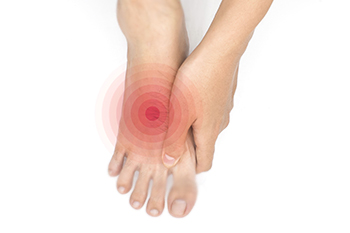
Maintaining proper foot care is important for diabetic patients. Many people who are diabetic have neuropathy, which is the inability to feel existing cuts or scrapes on the feet. This can be caused by elevated blood sugar levels that can happen from the foods that are eaten. An untreated wound on the foot may lead to incurring a foot ulcer, which is an infected wound. Serious consequences may occur if prompt medical attention is not received. It is beneficial to implement a good diabetic foot care routine daily. It can begin with washing and drying the feet thoroughly, especially between the toes. This can be followed by closely inspecting the bottom of the feet for cuts that cannot be felt. Many people use a mirror to accomplish this, or a family member or caregiver may help to do this. Trimming the toenails once per week may help to prevent an ingrown toenail from developing, which can cause severe pain and discomfort. If you have diabetes, it is strongly suggested that you are under the care of a podiatrist who can help you to manage this condition.
Diabetic foot care is important in preventing foot ailments such as ulcers. If you are suffering from diabetes or have any other concerns about your feet, contact one of our podiatrists from New England Foot and Ankle. Our doctors can provide the care you need to keep you pain-free and on your feet.
Diabetic Foot Care
Diabetes affects millions of people every year. The condition can damage blood vessels in many parts of the body, especially the feet. Because of this, taking care of your feet is essential if you have diabetes, and having a podiatrist help monitor your foot health is highly recommended.
The Importance of Caring for Your Feet
- Routinely inspect your feet for bruises or sores.
- Wear socks that fit your feet comfortably.
- Wear comfortable shoes that provide adequate support.
Patients with diabetes should have their doctor monitor their blood levels, as blood sugar levels play such a huge role in diabetic care. Monitoring these levels on a regular basis is highly advised.
It is always best to inform your healthcare professional of any concerns you may have regarding your feet, especially for diabetic patients. Early treatment and routine foot examinations are keys to maintaining proper health, especially because severe complications can arise if proper treatment is not applied.
If you have any questions please feel free to contact one of our offices located in Chelmsford and Newburyport, MA . We offer the newest diagnostic and treatment technologies for all your foot and ankle needs.
Excess Uric Acid and Gout
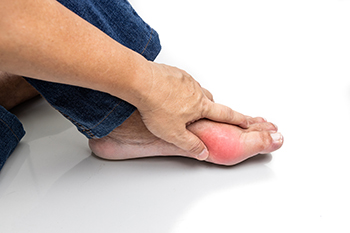
Gout is a painful form of arthritis that can affect the joints in the big toe. Gout is caused by excess uric acid in the blood and can happen from the type of foods that are eaten. These foods can include shellfish, red meat, and other foods that are laden with purines. When an abundance of these types of foods is regularly eaten, the kidneys cannot absorb the purines, and the body will convert them into uric acid. This can turn into crystals that lodge in the joints of the feet. Genetics may also be a reason gout may occur, and it is helpful to learn about what type of foods to eat and to avoid. A diagnosis generally consists of having a needle inserted in the inflamed joint, which can extract a sample of the fluid. This can be successful in confirming if a gout attack has occurred. Gout may dissipate naturally, although it is beneficial to implement effective prevention methods. These can consist of following a healthy diet, drinking plenty of water daily, and losing extra weight, if applicable. If you suffer from gout, it is suggested that you are under the care of a podiatrist who can help you to manage this condition.
Gout is a painful condition that can be treated. If you are seeking treatment, contact one of our podiatrists from New England Foot and Ankle. Our doctors will treat your foot and ankle needs.
What Is Gout?
Gout is a form of arthritis that is characterized by sudden, severe attacks of pain, redness, and tenderness in the joints. The condition usually affects the joint at the base of the big toe. A gout attack can occur at any random time, such as the middle of the night while you are asleep.
Symptoms
- Intense Joint Pain - Usually around the large joint of your big toe, and it most severe within the first four to twelve hours
- Lingering Discomfort - Joint discomfort may last from a few days to a few weeks
- Inflammation and Redness -Affected joints may become swollen, tender, warm and red
- Limited Range of Motion - May experience a decrease in joint mobility
Risk Factors
- Genetics - If family members have gout, you’re more likely to have it
- Medications - Diuretic medications can raise uric acid levels
- Gender/Age - Gout is more common in men until the age of 60. It is believed that estrogen protects women until that point
- Diet - Eating red meat and shellfish increases your risk
- Alcohol - Having more than two alcoholic drinks per day increases your risk
- Obesity - Obese people are at a higher risk for gout
Prior to visiting your podiatrist to receive treatment for gout, there are a few things you should do beforehand. If you have gout you should write down your symptoms--including when they started and how often you experience them, important medical information you may have, and any questions you may have. Writing down these three things will help your podiatrist in assessing your specific situation so that he or she may provide the best route of treatment for you.
If you have any questions, please feel free to contact one of our offices located in Chelmsford and Newburyport, MA . We offer the newest diagnostic and treatment technologies for all your foot care needs.
Preventing Ingrown Toenails
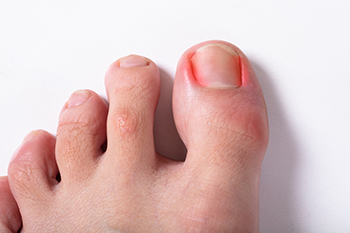
Ingrown toenails happen when the toenail grows into its surrounding skin. This can be uncomfortable, as the nail pierces the skin and becomes tender, red, and swollen. The big toe is the most often affected by this affliction, and if not tended to, it can bleed and become infected. If one is diabetic and has an ingrown toenail, they need to obtain immediate medical care as this can turn into a serious complication with their propensity towards infections and slower healing. To prevent ingrown toenails, it is important to cut toenails straight across rather than in a curved fashion, wear shoes that fit well and do not bind the toes in any way, and wear socks or other foot coverings to protect the feet. Examining the feet for excessive sweat or injury can help in the prevention of ingrown toenails as well. Wet feet can cause the toenails to soften, and it becomes easier for the nail to grow into the skin. Even a stubbed toe can cause a toenail to pierce the skin. If you develop an ingrown toenail, it is suggested that you make an appointment with a podiatrist who can provide the best treatment option for you.
Ingrown toenails can become painful if they are not treated properly. For more information about ingrown toenails, contact one of our podiatrists of New England Foot and Ankle. Our doctors can provide the care you need to keep you pain-free and on your feet.
Ingrown Toenails
Ingrown toenails occur when a toenail grows sideways into the bed of the nail, causing pain, swelling, and possibly infection.
Causes
- Bacterial infections
- Improper nail cutting such as cutting it too short or not straight across
- Trauma to the toe, such as stubbing, which causes the nail to grow back irregularly
- Ill-fitting shoes that bunch the toes too close together
- Genetic predisposition
Prevention
Because ingrown toenails are not something found outside of shoe-wearing cultures, going barefoot as often as possible will decrease the likeliness of developing ingrown toenails. Wearing proper fitting shoes and using proper cutting techniques will also help decrease your risk of developing ingrown toenails.
Treatment
Ingrown toenails are a very treatable foot condition. In minor cases, soaking the affected area in salt or antibacterial soaps will not only help with the ingrown nail itself, but also help prevent any infections from occurring. In more severe cases, surgery is an option. In either case, speaking to your podiatrist about this condition will help you get a better understanding of specific treatment options that are right for you.
If you have any questions please feel free to contact one of our offices located in Chelmsford and Newburyport, MA . We offer the newest diagnostic and treatment technologies for all your foot and ankle needs.
Arthritis Can Cause Pain in the Feet and Ankles
Surgery for Bunions
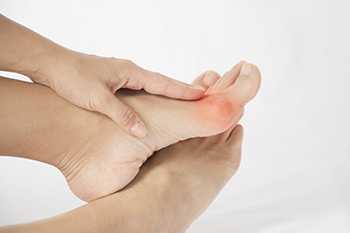
Even if you are unfamiliar with the field of podiatry, you might have already heard about the foot condition known as bunions. Bunions are a kind of bony bump that can form on the outer side of the big toe. There are many ways to treat a bunion and they often depend on the severity of the patient’s case. For example, a podiatrist might recommend a surgical procedure if the bunion is particularly severe. A surgical procedure might be effective in treating bunions because it realigns the joints and removes the bony growth. If you are suffering from significant pain from the bunion or a toe deformity, this might be an indication that surgery be considered. Importantly, there are many types of bunion surgeries, including a bunionectomy and osteotomy. If you are currently living with a bunion, it is suggested that you contact a podiatrist for more information about treatment options.
If you are suffering from bunions, contact one of our podiatrists of New England Foot and Ankle. Our doctors can provide the care you need to keep you pain-free and on your feet.
What Is a Bunion?
A bunion is formed of swollen tissue or an enlargement of boney growth, usually located at the base joint of the toe that connects to the foot. The swelling occurs due to the bones in the big toe shifting inward, which impacts the other toes of the foot. This causes the area around the base of the big toe to become inflamed and painful.
Why Do Bunions Form?
Genetics – Susceptibility to bunions are often hereditary
Stress on the feet – Poorly fitted and uncomfortable footwear that places stress on feet, such as heels, can worsen existing bunions
How Are Bunions Diagnosed?
Doctors often perform two tests – blood tests and x-rays – when trying to diagnose bunions, especially in the early stages of development. Blood tests help determine if the foot pain is being caused by something else, such as arthritis, while x-rays provide a clear picture of your bone structure to your doctor.
How Are Bunions Treated?
- Refrain from wearing heels or similar shoes that cause discomfort
- Select wider shoes that can provide more comfort and reduce pain
- Anti-inflammatory and pain management drugs
- Orthotics or foot inserts
- Surgery
If you have any questions, please feel free to contact one of our offices located in Chelmsford and Newburyport, MA . We offer the newest diagnostic and treatment technologies for all your foot care needs.
Tips for Preventing Falls in Older Adults
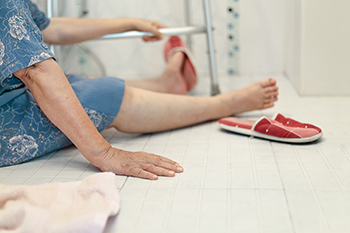
Statistics show that falls among seniors are the leading cause of death from injury in that age group. For this reason, preventing falls in older adults is imperative. Start with safety-proofing the home. Remove scatter rugs and clear pathways. Improve lighting and remove long wires that can easily be tripped over. Install grab bars and use non-skid mats in bathrooms. Doing exercises to improve balance also can help prevent falls. Wearing shoes with non-slip soles and avoiding walking barefoot are two more preventative measures. Some medication has side effects that cause dizziness or changes to blood pressure, so it is a good idea to discuss alternatives. Having regular vision checkups is important to make sure prescriptions are up to date. Seniors who are frail or have mobility issues may wish to use a device, such as a walker, walking stick, or cane, to keep them upright, especially at night. For more information on methods that may help to prevent falling, it is suggested that older adults and their families seek the counsel of a podiatrist.
Preventing falls among the elderly is very important. If you are older and have fallen or fear that you are prone to falling, consult with one of our podiatrists from New England Foot and Ankle. Our doctors will assess your condition and provide you with quality advice and care.
Every 11 seconds, an elderly American is being treated in an emergency room for a fall related injury. Falls are the leading cause of head and hip injuries for those 65 and older. Due to decreases in strength, balance, senses, and lack of awareness, elderly persons are very susceptible to falling. Thankfully, there are a number of things older persons can do to prevent falls.
How to Prevent Falls
Some effective methods that older persons can do to prevent falls include:
- Enrolling in strength and balance exercise program to increase balance and strength
- Periodically having your sight and hearing checked
- Discuss any medications you have with a doctor to see if it increases the risk of falling
- Clearing the house of falling hazards and installing devices like grab bars and railings
- Utilizing a walker or cane
- Wearing shoes that provide good support and cushioning
- Talking to family members about falling and increasing awareness
Falling can be a traumatic and embarrassing experience for elderly persons; this can make them less willing to leave the house, and less willing to talk to someone about their fears of falling. Doing such things, however, will increase the likelihood of tripping or losing one’s balance. Knowing the causes of falling and how to prevent them is the best way to mitigate the risk of serious injury.
If you have any questions, please feel free to contact one of our offices located in Chelmsford and Newburyport, MA . We offer the newest diagnostic and treatment technologies for all your foot care needs.
Blog Archives
- March 2025
- February 2025
- January 2025
- December 2024
- November 2024
- October 2024
- September 2024
- August 2024
- July 2024
- June 2024
- May 2024
- April 2024
- March 2024
- February 2024
- January 2024
- December 2023
- November 2023
- October 2023
- September 2023
- August 2023
- July 2023
- June 2023
- May 2023
- April 2023
- March 2023
- February 2023
- January 2023
- December 2022
- November 2022
- October 2022
- September 2022
- August 2022
- July 2022
- June 2022
- May 2022
- April 2022
- March 2022
- February 2022
- January 2022
- December 2021
- November 2021
- October 2021
- September 2021
- August 2021
- July 2021
- June 2021
- May 2021
- April 2021
- March 2021
- February 2021
- January 2021
- December 2020
- November 2020
- October 2020
- September 2020
- August 2020
- July 2020
- June 2020
- May 2020
- April 2020
- March 2020
- February 2020
- January 2020
- December 2019
- November 2019
- October 2019
- September 2019
- August 2019
- July 2019
- June 2019
- May 2019
- April 2019
- March 2019
- February 2019
- January 2019
- December 2018
- November 2018
- October 2018
- September 2018
- August 2018
- July 2018
- June 2018
- May 2018
- April 2018
- March 2018
- February 2018
- January 2018
- December 2017
- November 2017
- October 2017
- September 2017
- August 2017
- July 2017
- June 2017
- May 2017
- April 2017
- March 2017
- February 2017
- March 2016

